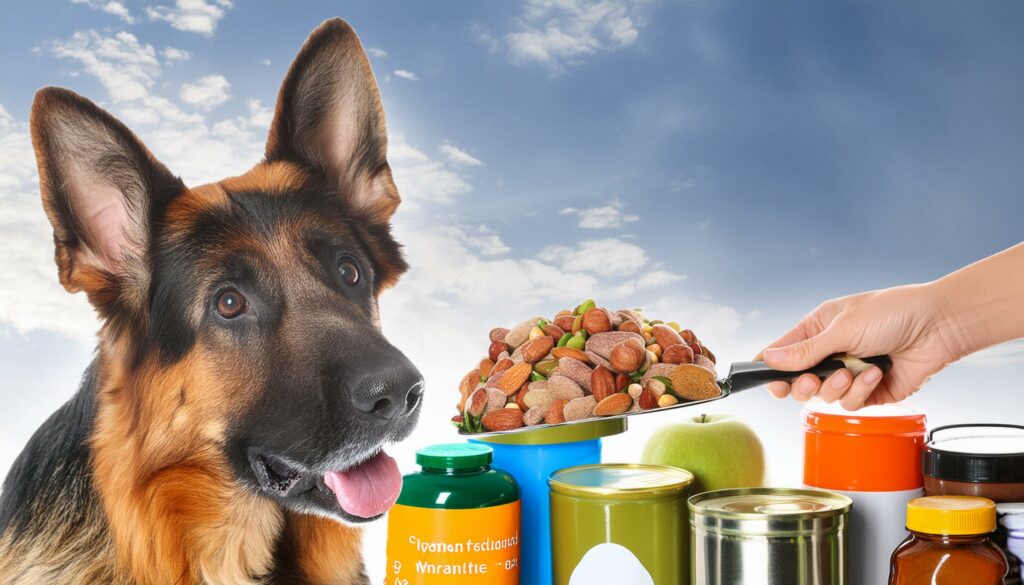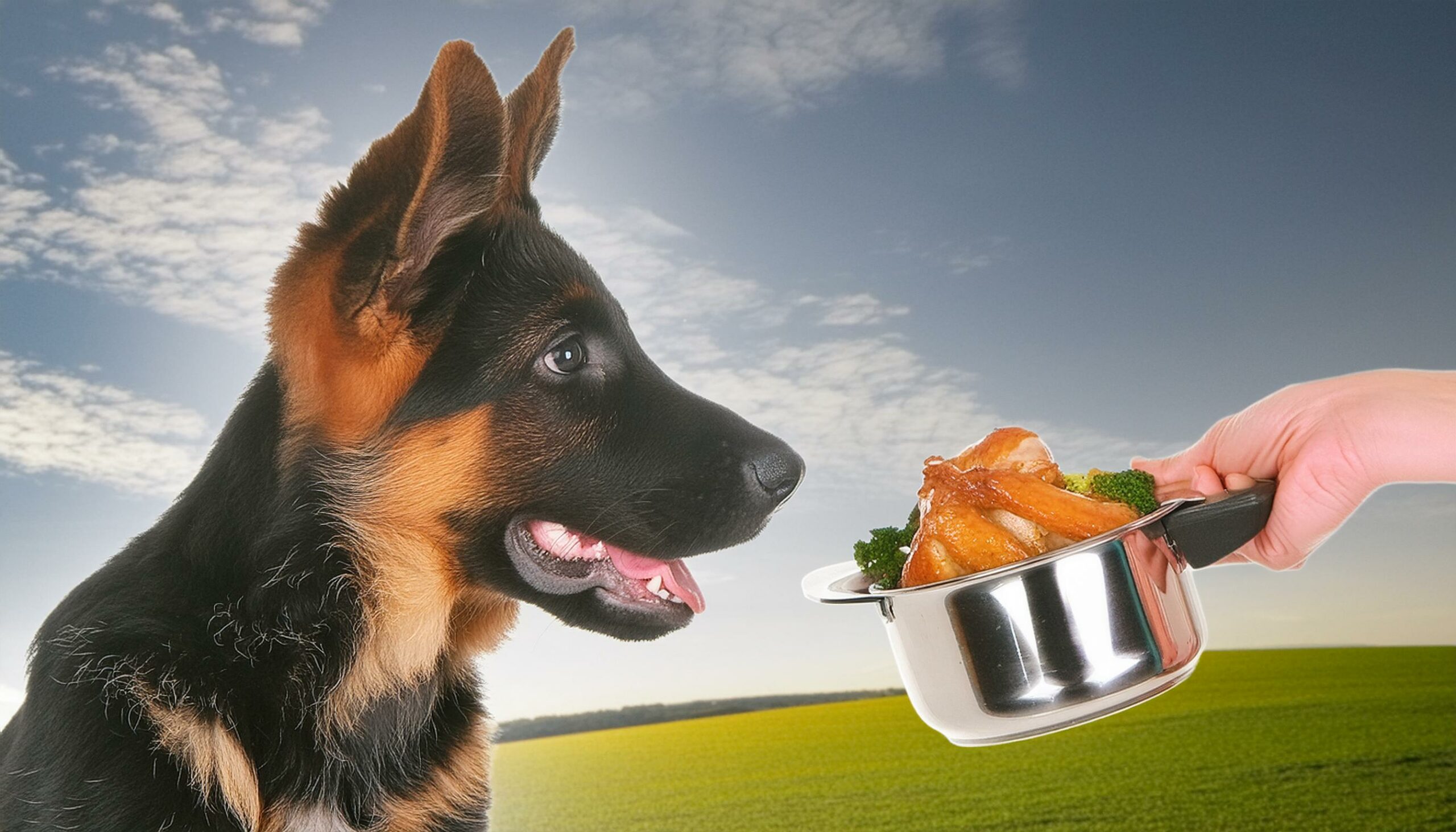German Shepherd puppies, like all dogs, require a balanced diet to grow healthy and strong. As a devoted pet owner, you naturally want to provide the best nutrition for your furry friend. One common inquiry among German Shepherd owners is whether it’s safe to introduce cooked chicken into their puppy’s diet. This article aims to address this question comprehensively, shedding light on the benefits, risks, and proper feeding guidelines associated with cooked chicken for German Shepherd puppies.
Nutritional Needs of German Shepherd Puppies
Before delving into the specifics of feeding cooked chicken to German Shepherd puppies, it’s essential to understand their nutritional requirements.
Protein Requirements
Protein is the cornerstone of a puppy’s diet, crucial for muscle development, tissue repair, and overall growth. German Shepherd puppies, known for their athleticism and energy, particularly benefit from high-quality protein sources. Chicken, a lean and easily digestible protein, aligns well with their dietary needs.
Fat Requirements
Fat serves as a concentrated source of energy for puppies, supporting various bodily functions such as hormone production and nutrient absorption. While essential, moderation is key, as excessive fat intake can lead to weight gain and associated health issues.
Essential Nutrients
In addition to protein and fat, German Shepherd puppies require a spectrum of essential nutrients to support their immune system, bone development, and cognitive function. A well-balanced diet comprising vitamins, minerals, and antioxidants is vital for their overall well-being.
Can German Shepherd Puppies Eat Cooked Chicken?
Benefits of Chicken for Puppies
Cooked chicken offers several benefits for German Shepherd puppies when incorporated into their diet responsibly. As a lean protein source, chicken provides the amino acids necessary for muscle growth and repair. Furthermore, it is highly palatable and easy to digest, making it suitable for puppies with sensitive stomachs.
Risks Associated with Cooked Chicken
While cooked chicken can be a nutritious addition to your puppy’s meals, it’s essential to be aware of potential risks. One primary concern is the ingestion of bones, which can splinter and cause choking hazards or internal injuries. Additionally, seasoned or spiced chicken may contain ingredients that are harmful or irritating to your puppy’s digestive system.
Proper Way to Feed Cooked Chicken to a German Shepherd Puppy

Preparation Tips
When preparing chicken for your German Shepherd puppy, follow these guidelines to ensure safety and optimal nutrition:
- Thorough Cooking: Cook chicken thoroughly to eliminate any harmful bacteria, reducing the risk of foodborne illness.
- Bone Removal: Remove bones from cooked chicken to prevent choking hazards and gastrointestinal obstructions.
- Minimal Seasoning: Avoid seasoning or adding spices to chicken, as these ingredients may be too harsh for your puppy’s delicate stomach.
Portion Control
Introduce cooked chicken into your puppy’s diet gradually, monitoring their response to prevent digestive upset. Treats should complement their regular meals rather than replace them entirely. Consult with your veterinarian to determine appropriate portion sizes based on your puppy’s age, weight, and activity level.
Other Human Foods Safe for German Shepherd Puppies
In addition to cooked chicken, several other human foods can be safely incorporated into a German Shepherd puppy’s diet.
- Vegetables: Carrots, peas, and sweet potatoes provide essential vitamins and fiber, promoting digestive health and overall well-being.
- Fruits: Apples, bananas, and blueberries offer antioxidants and vitamins, contributing to a balanced diet and healthy immune system.
- Grains: Cooked rice and oatmeal serve as excellent sources of carbohydrates and fiber, supporting energy levels and digestive function.
Foods to Avoid
While some human foods are safe and beneficial for German Shepherd puppies, others should be strictly avoided due to potential health risks.
- Chocolate: Contains theobromine, a toxic compound that can cause adverse effects ranging from gastrointestinal upset to seizures and even death.
- Grapes and Raisins: Can lead to kidney failure in dogs, with symptoms including vomiting, lethargy, and decreased urine output.
- Onions and Garlic: Contain compounds that can damage a dog’s red blood cells, leading to anemia and other serious health issues.
Signs of Food Allergies or Intolerance
It’s essential to monitor your German Shepherd puppy for any signs of food allergies or intolerance when introducing new foods into their diet. Common symptoms may include:
- Itching or scratching
- Digestive upset, such as vomiting or diarrhea
- Skin rashes or inflammation
If you observe any of these symptoms, discontinue feeding the food in question and consult your veterinarian for further guidance.
Consulting with a Veterinarian
Before making significant changes to your puppy’s diet or introducing new foods, it’s advisable to seek guidance from a veterinarian. They can offer personalized recommendations tailored to your puppy’s specific needs and health status, ensuring their dietary requirements are met safely and effectively.
Training and Feeding Schedule
Incorporating cooked chicken into your German Shepherd puppy’s training routine can be both enjoyable and beneficial. Use small pieces of chicken as rewards during training sessions to reinforce positive behaviors and strengthen your bond with your puppy. Additionally, establish a consistent feeding schedule to provide structure and routine, ensuring your puppy receives the nutrition they need to thrive.
Conclusion
In conclusion, cooked chicken can be a nutritious and safe addition to your German Shepherd puppy’s diet when prepared and served correctly. However, it’s essential to be mindful of potential risks, such as bone ingestion and seasoning additives. By following proper preparation and feeding guidelines, consulting with your veterinarian, and monitoring your puppy’s response, you can incorporate cooked chicken into their meals responsibly, contributing to their overall health and well-being.
FAQs
Can German Shepherd puppies eat raw chicken?
It’s not recommended to feed raw chicken to puppies due to the risk of bacterial contamination and potential health issues.
How often should I feed cooked chicken to my German Shepherd puppy?
Cooked chicken should be offered in moderation as an occasional treat, rather than a primary component of their diet. Consult with your veterinarian for specific feeding recommendations based on your puppy’s age, weight, and dietary needs.
What should I do if my puppy shows signs of food allergies after eating cooked chicken?
If your puppy displays symptoms of food allergies or intolerance, discontinue feeding the suspected food and consult your veterinarian for further evaluation and guidance.
Are there any specific spices or seasonings I should avoid when cooking chicken for my puppy?
Yes, it’s best to avoid seasoning or adding spices to cooked chicken for puppies, as these ingredients may be too harsh for their sensitive digestive systems.
Can cooked chicken bones be given to German Shepherd puppies?
No, cooked chicken bones should never be given to puppies, as they can splinter and cause choking or internal injuries.
